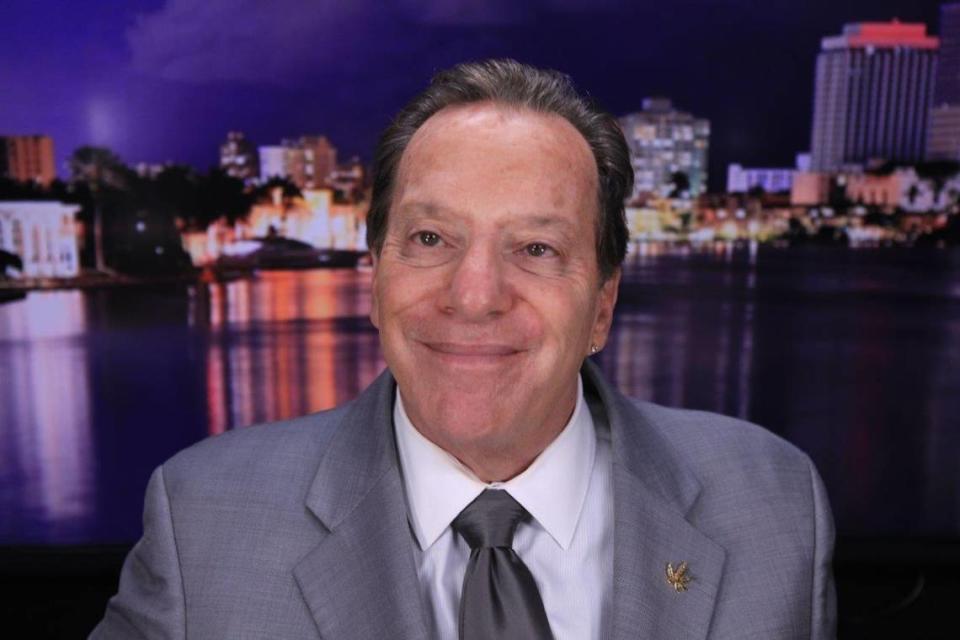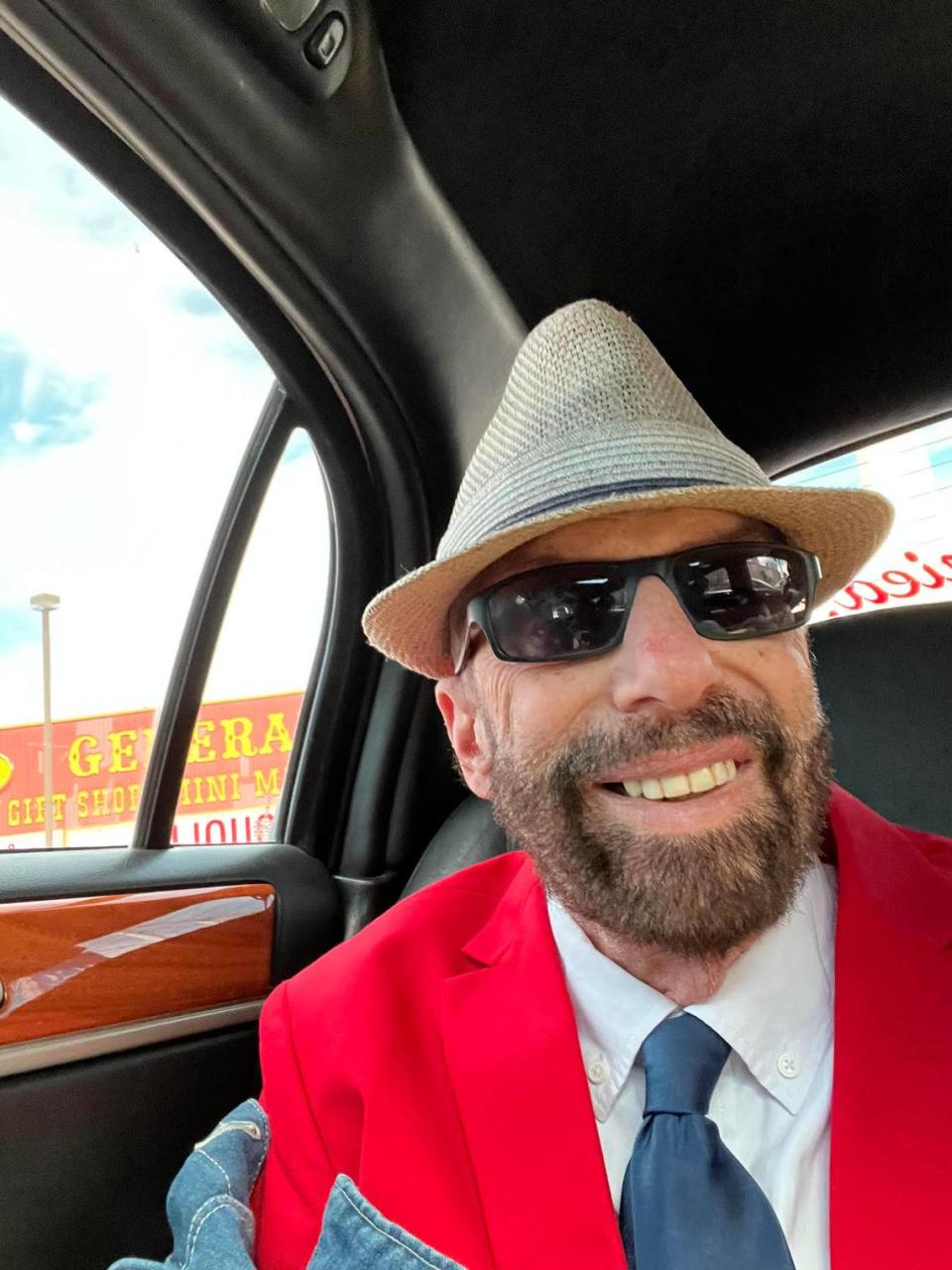He was an attorney, publisher, LGBT rights activist, baseball fan. Norm Kent dies at 73
- Oops!Something went wrong.Please try again later.
Attorney Norm Kent — relentless fighter for marijuana and LGBT rights, baseball fanatic, popular radio talk host and co-founder of South Florida Gay News — died at 73 on Thursday, April 13. His death came 18 months after learning he had pancreatic cancer.
In his final interview on March 28, Kent told SFGN he was diagnosed in October 2021.
“That day, I said, ‘Let’s fly to Atlanta and go to a Dodgers game. If they’re telling me I have cancer, we’re going to a baseball game.’”
“You definitely can’t accuse him of not being interesting,” said Fort Lauderdale attorney Russell Cormican, Kent’s law partner for nearly 25 years.
“The most important thing looking at Norm’s legacy is that he reminds us how important it is to stand up for what you believe in, no matter how unpopular it might be or what types of repercussions or blowback you might get from people, if you know what you’re doing is the right thing,” said Cormican, 51. “When he sees an injustice, he’s not afraid to lead the call against it. That’s the common thread that’s gone through his life.”
Born Norman Elliott Kent in Brooklyn, New York, on Oct. 18, 1949, his family soon moved to North Woodmere in Nassau County on Long Island.
“Ever since I was a little kid growing up in North Woodmere and taking Bus 53 to junior varsity games, I was a good, competitive baseball player. The doctor once said I had steel springs in my legs,” Kent had said. “I just loved the game. I love it now because you don’t know what’s going to happen on the next pitch. It’s not scripted like a movie. Like comedians, you never know what the next joke is going to be.”
To never miss a game, Kent equipped his longtime small, two-bedroom Victoria Park home with 16 televisions.
Thirty years ago, he even owned a baseball card shop at the Gateway Shopping Center in Fort Lauderdale, Norm Kent’s Baseball Heaven.
Kent, who is survived by older brother Richard and younger brother Alan, once flirted with becoming a professional ballplayer but their dad Jesse told him, “You’re going to be the lawyer in the family.”
After graduating in 1971 from Hofstra University on Long Island with a bachelor’s degree in social sciences and sociology, Kent made his father happy and received a Hofstra law degree in 1975.
Marijuana proponent
During college, Kent began establishing a national reputation as a leading proponent of legalizing marijuana use.
Kent joined NORML, the National Organization for the Reform of Marijuana Laws in 1971. He served 1992-94 on NORML’s national board, rejoined the governing body in 1998 and from 2013-14 served as national board chairman.
In 1988, Kent made headlines representing singer Elvy Musikka, a Hollywood woman nearly blinded by cataracts who was busted for growing pot in her own backyard.
“After 23 different operations for cataracts,” Kent recalled March 28, “she found the only thing that let her see was by taking marijuana. It had a certain THC in it which let her see.”
He continued: “Who was her government, or the president, to stop her from seeing? And when the police came to her house in Hollywood and said we’re going to have to arrest you for smoking pot, she said, ‘I dare you to. I don’t care. It’s my life. It’s my right to see.’
“She went to a lawyer. She went to me. And I said let’s go to court. We argued a case in [Broward Circuit Court] before Judge Mark E. Polen and we won. He said your right to smoke marijuana is a lot more important than the right of the government to tell you what to do with what you can smoke. That case became the seminal case for hundreds of others.”
While dying of cancer, Kent himself couldn’t find pain relief smoking marijuana: “No,” he said, “I had a respiratory condition in 2018 when I got a defibrillator and pacemaker.”
In South Florida
Shortly after college, Kent worked briefly as an urban affairs analyst for the New York Legislature, and in 1978 relocated to South Florida where his parents had moved.
Kent never officially told them he was gay.
“My parents always suspected he was gay from the time he moved to Fort Lauderdale,” said his brother Alan, a retired psychologist. “They would always ask me, ‘Do you think Norman is gay?’”
Alan Kent, who also is gay, came out to their parents in 1982. Five years later, after their father died, Norm called Alan from Provincetown, Massachusetts, with some news: I’m gay.
“I said really? Tell me something I don’t know,” Alan Kent recalled.
Before he died, Norm Kent said that for him “there was no such thing” as being in the closet.
“There was always this fear that as a gay lawyer it might cost me economically,” Kent said. “But there I was, a gay lawyer who was representing gay bars and gay friends and gay owners.”

Runaway advocate
After he moved to South Florida, Kent briefly wrote a column for Playbill magazine and taught sociology at Florida Atlantic University. Soon he became known locally as an advocate for runaway gay youths who hung out at Fort Lauderdale beach.

On the strip, Kent interviewed 30 boys ages 12 to 20 working as prostitutes. By 1984, Kent had spoken with about 150 boys on the strip — a third of them said they had sold their bodies to survive.
For years, Fort Lauderdale police and politicians worked to downplay the local homeless problem, according to a 1989 Miami Herald profile of Kent headlined “Upholder of the Unpopular.”
“It was like the mayor in Amity denying that there was a shark out there,” Kent told the Herald, referring to the blockbuster 1975 film of the era, “Jaws.”
Kent spent the rest of his life advocating for homeless gay youth. In 2000 — after having just survived treatment for lymphoma — Kent met John Fugate, then 18 and disowned since middle school by his Lakeland family. Kent, who at the time published the Express Gay News in Fort Lauderdale, offered Fugate a job delivering newspapers.
“I was living under the bridge on Federal Highway just south of 26th Street,” Fugate said March 28, weeping, a few feet from Kent’s hospice bedside. “And Norman found out that I was sleeping on the street and he invites me to the Floridian Restaurant for dinner.”
That night, Kent told him: “I just want you to know if you ever need a place to stay, you can always stay at my house. Here are the keys.”
At first, Fugate said he was “too proud and scared” to come to Kent’s home. But a few weeks later, about 3 a.m. on a cold, rainy morning, Fugate showed up. Eventually, he moved in.
Despite their age difference, Kent, 53, and Fugate, 21, became partners. Seven years later, they ended their romantic relationship. But they remained close friends and continued to work together on and off. After Kent’s health began to decline in 2018, Fugate and his new husband, Brian Swinford, stepped in as Kent’s caregivers. Fugate said Thursday that Kent died of a recently diagnosed lung cancer.
Mark Possíen, Kent’s close friend since 1977, described his Victoria Park home as “a refuge for so many people.”
“If you were down and out, he would invite you to come and stay with him. He’d get you a job. If you were on drugs, he tried to get you off drugs,” Possíen said. “He was selfless. He did everything with no expectation of any kind or return or reward from the person.”
About 1991, Possíen moved into a spare room in the Victoria Park house where Kent helped him launch Catalog X, one of the first gay-owned mail-order adult toy businesses.
By 1998, Possíen had opened two Catalog X retail stores, one in Fort Lauderdale, the other in South Beach.
Media celebrity
During college on Long Island, Kent dabbled as a reporter writing for the local Jewish Journal and Nassau Herald.Later in South Florida, Kent himself became a media celebrity.
“He’s lived his life in the public eye,” Kent’s brother Alan said. “Norman has done a lot of good stuff and he’s had a lot of recognition for what he accomplished.”
From 1989 to 1992, Kent had his own daily talk show on WFTL AM. Later, he hosted various radio programs including one broadcast live during the breakfast rush at the Floridian on Las Olas Boulevard.
He also represented talk host Neil Rogers in the radio business. “I wound up making him, as his agent, $1.5 million a year,” Kent said.
In 1999, Kent took on a new title: newspaper publisher. He launched the Express Gay News, which covered all aspects of queer life in South Florida.
Kent sold the paper four years later to Window Media, a national LGBT media group that renamed it the South Florida Blade. Window Media went bankrupt in November 2009 and quickly shut down the Blade. Most of the staff of the Blade reorganized and launched the Florida Agenda, which shut down in 2016.
In January 2010, Kent launched a new newspaper and website called South Florida Gay News, along with a new business partner Piero Guidugli, who stayed with the company until 2020.
Over the past five years, Kent suffered several life-threatening health setbacks. He had two brain surgeries to remove tumors, COVID in 2021 and then the pancreatic cancer diagnosis. Last September, he stepped down as publisher and handed the running of SFGN to Associate Publisher Jason Parsley.
Parsley, 45, a one-time hairstylist who in 2007 got a journalism degree from Florida Atlantic University, has worked at SFGN since 2011.
Parsley said Kent “had a passion for journalism and being a storyteller.”
“He leaves a long legacy of journalism and a dogged pursuit of the truth,” Parsley said. “He wasn’t just a news reporter. He also wrote scathing and biting — truthful — editorials that would sometimes call out members of our own community and push the ball forward.”
Services
A public celebration of Norm Kent’s life and funeral service will be 11 a.m. Monday at The Manor Complex, 2345 Wilton Dr., Wilton Manors. Burial will follow at Star of David Memorial Gardens & Funeral Chapel in North Lauderdale.
Journalist Steve Rothaus covered LGBTQ issues for 22 years at the Miami Herald. @SteveRothaus on Twitter.

